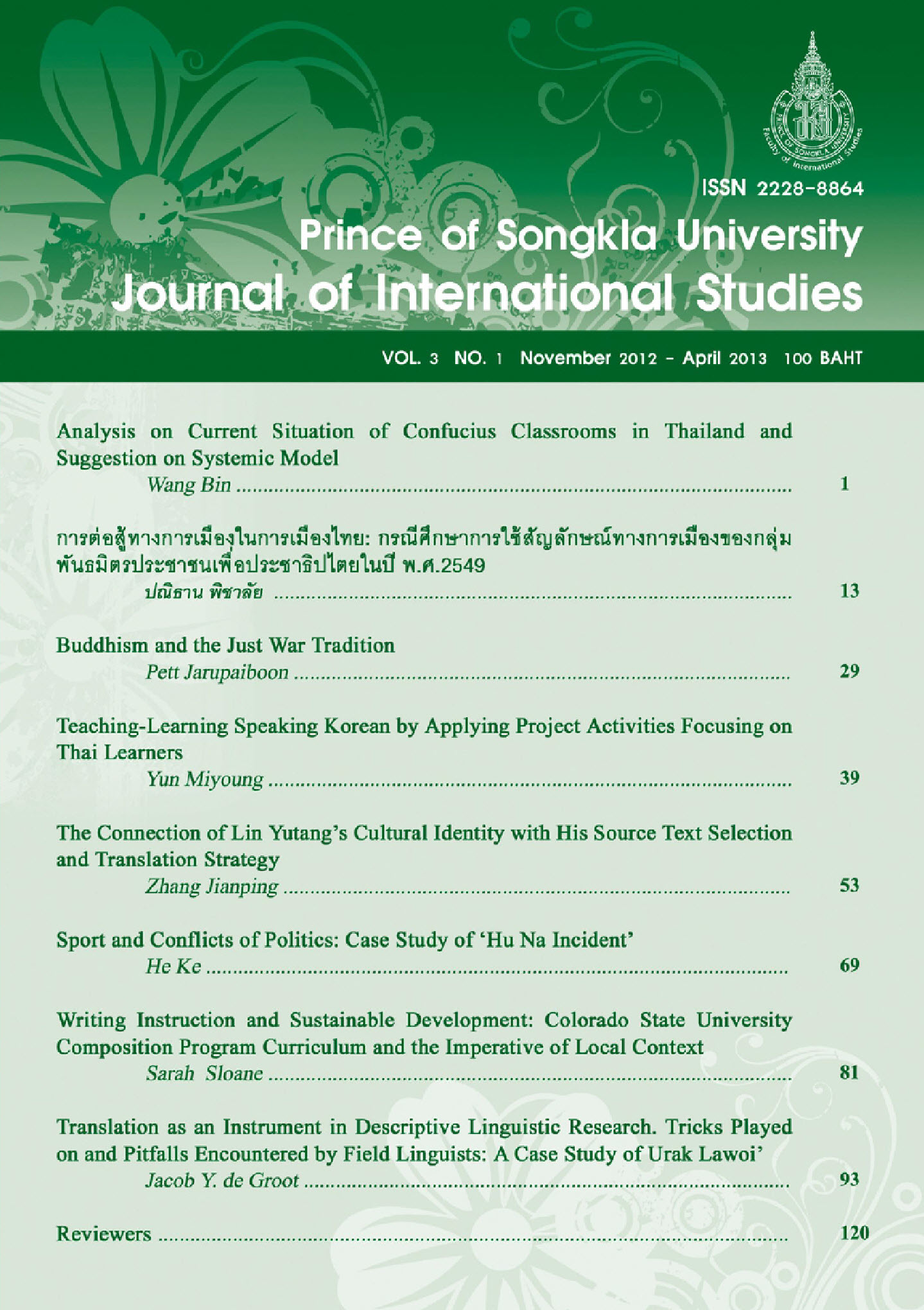Translation as an Instrument in Descriptive Linguistic Research. Tricks Played on and Pitfalls Encountered by Field Linguists: A Case Study of Urak Lawoi
Main Article Content
Abstract
Translation is an all too easily accepted instrument in linguistic field research. Linguistic researchers use translation and translators in order to find, compare and get acquainted with the words and grammar of their target language'. During the research, as long as a field language is used, translation is part of the research method. In researching a language which origins and superficial appearance are close to languages well-known to the researcher, the inclination he might feel to translate an apparent cognate in the target language with their phonemic lookalike in these languages he knows is understandable. This disposition might even be enhanced when, out of necessity, these languages are used as field languages during the research. However, when a field language closely related to the dialects or languages researched is used, and precisely when the lingual nature and traditions of ethnic groups with a divergent world view or with a different cultural awareness are the subjects under research, the researcher should consider the fact that these two last factors will have an impact on the use of language within its relation to the cultural and natural world of its speakers: their language describes their world, not our world or even the world. Therefore, in order to understand not only the semantics of the language of a group under study but also its deviant referential socio-psychological and cultural cadre, the instrument oftranslation must under certain conditions be abandoned to make place for a more holistic and even intuitive descriptive approach.
Article Details
Statements and opinions expressed in articles herein are those of the authors and do not necessarily reflect the position of the editors or publisher.
Article, information, text, image, etc. which are published in Journal of International Studies, belong to Journal of International Studies. If anybody or any organization would like to use part or whole of them, they must receive written permission from Journal of International Studies before usage.
References
Georges. (1930). Les inscriptions malaises de Crīvijaya. Bulletin de l'Ecole française d'Extrême-Orient. Tome 30, pp. 29-80. Deutscher, Guy (2009). The Unfolding of Language. New York: Metropolitan Groot,
Jacob Y. de (2012). Urak Lawoi' language and social history. Phuket: Prince of Songkla University Groot, Jacob Y. de (2010). Urak Lawoi'; a language in transition. Papers of the 3rd annual PSU Phuket Research Conference, 2010. Phuket: Prince of Songkla University Groot,
Jacob Y. de (2011). The legend of To' Kiri; unravelling an oral tradition about the home-land of the Urak Lawoi'. Phuket: Prince of Songkla University Journal of International Studies Vol.1 No. 2
Hogan, D. and Pattemore, S.W. (1998). Urak Lawoi': Basic structures and dictionary. Canberra: Pacific Linguistics
Locke, John (1690). An Essay co Ssay concerning human understanding, 4 Vols. London: Eliz. Holt
Miller, A. (2008). Philosophy of Language, London and New York: Routledge
Nozick, R. (1981). Philosophical Firml phical Explanations, Cambridge (Massachusetts): Harvard University Press Patterson, D. (2012). Alfred Tarski: Philosophy of Language and Logic. I MacMillan ski: Philosophy of Language and Logic. London: Palgrave
Tarski, A. (1944). "The Semantic Conception of Truth". Philosophy and Phenomenological Research 4 341-75.
Wittgenstein, L. (2009). Philosophical Investigations (4th Edition). Oxford: Wiley Blackwell.
Wittgenstein, L. (1922). Tractatus Logico-Philosophicus. London: Kegan Paul, Trench, Trubner & Co. Ltd.
Wongbusarakum, Supin (2002). The Urak Lawoi and the complexity of sustainable resource use. The political ecology of change in the Adang Archipelago, Andaman Sea, Thailand. Hawaii: University of Hawaii
Wongbusarakum, Supin (2007). Urak Lawoi' of the Adang Archipelago. Bangkok: Themma Group
อมร ทวีศักดิ์ (2529), ภาษาชาวเล, กรุงเทพ: มหาวิทยาลัยมหิดล


